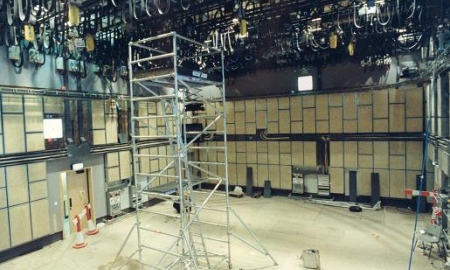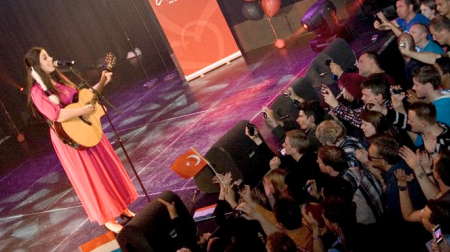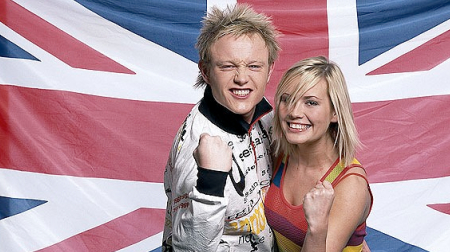“We’re keen to provide as many routes into the selection process as possible, whilst remaining realistic about the proven amount of experience required by anyone wishing to put themselves forward… In addition, we will happily consider entries submitted formally”
And with that blog post, the BBC’s Guy Freeman nudged the UK Eurovision fans into action. It’s been a long time since there was a formal call for songs, at such an early stage, publicised so widely, for the United Kingdom’s entry into the Eurovision Song Contest. The blog post is a promising sign, but UK fans do need to temper their enthusiasm just a bit. Freeman is saying exactly the same as last year, the only difference being that there is a formal submission process (as opposed to people doing a bit of detective work and sending in a demo).
This sends out a lot of signals, and almost all of them are good.

The 2012 UK National Final… an empty BBC Studio A
Dear Fans, The BBC Is Doing Something
One thing that the announcement will do is placate the Eurovision fan base. The UK fans have been very vocal over the last few years at the lack of information about the BBC’s process throughout the whole year. While anyone who knows how the television industry works will realise that there’s nobody officially ‘on the clock’ until the Finals get closer, the silence can be overpowering when details on the various ‘tentpole’ National Finals around the Continent are filing the Eurovision websites.
What are the BBC up to? Well they are accepting songs until November, and then they will all be judged through December and into January, and then there’ll become sort of decision in the New Year (when we’ll hear about the decision is another matter, best left for a discussion on how to promote your entry).
Naturally it would be unfair to give any public feedback on that process while it’s ongoing. And just like that, discussion is both started and directed down the proper channels until ‘Strictly Come Dancing’ is finished.
Listen Up, This Is The Plan
Now the BBC have laid out the rough plan to find a song for Vienna it’s worth looking at its method. It’s not going to be Mel and Sue hosted ‘Great British Song Contest’, but the selection process is there in black and white.
Since the internal selection of Blue for Dusseldorf 2011 (the first time in the UK’s Eurovision history that no public input was sought for, either through phone votes, texts, or sending in a postcard with your favourite song name), the BBC’s internal selection process has been criticised as belong closed off and remote. With no way of knowing about the process, Eurovision webmasters would get emails from singers, songwriters, composers, and production houses, all asking the same question… “how do I submit a song to the BBC?”

The UK fans are looking out for a hero (Marieke Duijts, EBU)
There’s an answer for that now, and everyone knows about it. The idea that the UK delegation goes into an empty room, and comes out with ‘the song’ is no longer the case. Anyone can send a song into that room for consideration.
That doesn’t mean that the UK song will come from one of the submissions. Freeman is clear in the blog post that the submission process is in addition to the method used to discover Molly last year:
We’re keen to provide as many routes into the selection process as possible, whilst remaining realistic about the proven amount of experience required by anyone wishing to put themselves forward. As we did last year, we will continue to talk to record labels and organisations who work with songwriters and artists every day – such as BBC Introducing – to suggest or create viable entries.
Adding the submission section to the scouting is far less expensive than holding a National Final while adding a layer of interaction with musical creatives around the world. I would expect the BBC to find an artist using the above process, rather than the open submission process, but I fully expect the PR following the announcement of the song to stress the open submission process.
The other consideration is that while the BBC has a number of musical resources (the aforementioned BBC Introducing, presumably The Sounds of 2015 to follow on from Sounds of 2014, Jools Holland, and the various music DJs and producers around the country), and they’ll presumably be able to find quality acts, will the acts want to represent the United kingdom at Eurovision?

Jemini, Eurovision 2003, UK
Molly has said that she needed a lot of convincing to actually decide to do the Contest – the attitude of her Swedish producer Anders Hansson to the Contest and its impact in Sweden cannot be discounted. The BBC could find the perfect act and they simply wouldn’t want to go ahead with the challenge (why? Read my thoughts on why someone won’t sing at the Contest here). Having a pool of a couple of hundred committed and presumably unsigned artists is a nice safety net, and presumably there’ll be some gold nuggets in the submission mix.
Would An Open Submission Process Produce A Winner?
Can it work? Yes. Will it work? Well there are almost forty other songs that will be fighting a result, and much of the result comes down to the running order and how well the song is sung live.
This is where Freeman’s attitude to a ‘typical’ Eurovision song is going to kick in. The UK Head of Delegation doesn’t look for a formula or a genre as being typical, but a song that the singer utterly believes in, that can be sung live with heart and emotion, that the performer will own. That’s a typical Eurovision song.
You’ve got to think that the UK are leaning towards a singer-songwriter, be it a solo singer or as part of a band, but I’m glad that all the channels are staying open. After all, Conchita Wurst was all set to go with her Eurovision track before a demo track of ‘Rise Like a Phoenix’ was posted to her ‘in the blind’.
There will be gems in the submitted songs, of that I am sure. The bigger question is if a strong song will be spotted by the BBC panel. If you hand 32 songs to the Swedish public (okay, 28 this year) and ask them each to choose the best song for the Contest, there will be fans of every song, even the cookie cutter Alcazar numbers. A small panel inside the BBC is going to come with a lot of notions and preconceptions as they listen to the submitted songs and the songs found from the scouting expedition and music industry recommendations.
That’s the trickiest part of the whole process. Someone has to set up and say “this is our song.”
Given the time I have spent with Freeman, he has the quiet decisiveness to take on board all the options and factors and make that call. Molly’s run to the Finals in Copenhagen brought the UK a lot of respect from the other countries at the 2014 Song Contest – the next few weeks and months let him know how much he has been able to improve the standing of the Contest back home, and how much work needs to be done.
You can listen to Ewan’s in-depth interview from Copenhagen with Guy Freeman here on ESC Insight, and the BBC’s Head of Delegation talks extensively about the thinking process behind ‘Children of the Universe’ and the BBC’s new approach to the Contest.









” It’s not going to be Mel and Sue hosted ‘Great British Song Contest’”
i’ll claim rights to the name but a national selection is not a bad idea. you can do on the iplayer and vote via an online poll.
You still need (a) the budget and (b) the TV studio infrastructure. An NF is relatively expensive, and the BBC, for all the licence fee, is under tight obligations to save money.
Also, I think Guy Freeman will have prior with GBSC 😉
I think what Guy Freeman does, is opening the way for a future UK NF.Not for this year but maybe in 2 or 3 years.